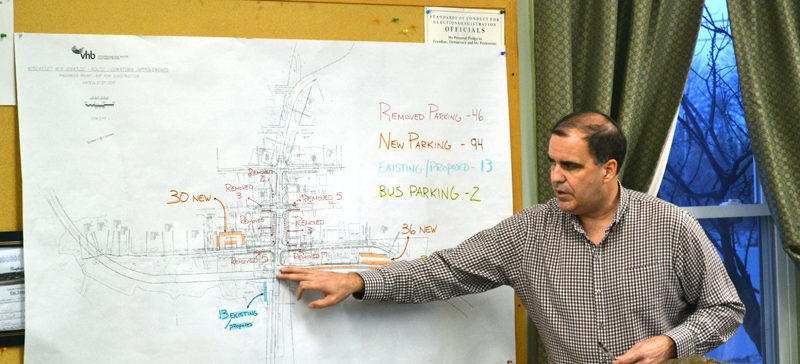
Maine Department of Transportation Project Manager Ernie Martin reviews the parking proposal for Wiscasset’s downtown traffic project with the Wiscasset Public Advisory Committee on Monday, Feb. 27. (Abigail Adams photo)
The Maine Department of Transportation’s Wiscasset downtown traffic project is progressing, despite a lawsuit by an owner of several downtown properties and a citizen’s petition in circulation calling for another vote on the project.
During a meeting between DOT officials and the Wiscasset Public Advisory Committee on Monday, Feb. 27, some final details about parking, one of the project’s most controversial aspects, were hammered out.
The parking proposal will undergo further review by a subcommittee formed at the meeting. The subcommittee, which will include Wiscasset Police Chief Jeffrey Lange, will examine the town’s parking ordinance.
Metered parking for the additional parking spaces in the proposal will be a topic of conversation for the subcommittee, Lange said. Metered parking would require a change to the ordinance.
DOT Project Manager Ernie Martin recommended a public information session to solicit additional feedback before the parking plans are finalized. The project “still has a long way to go,” Martin said.
The next steps will be to work with the Wiscasset Historic Preservation Commission and the utilities, such as water and sewer, Martin said. DOT officials, the public advisory committee, and the historic preservation commission are set to meet March 27 to address concerns and solicit feedback and guidance about historic preservation, Martin said.
Historic preservation has been a rallying cry for those opposed to the project. The Wiscasset Taxpayers Alliance, a grass-roots group circulating a petition to bring the project to voters at the annual town meeting by referendum in June, named a change from federal to state funding as cause for another, this time binding, vote.
The group has questioned whether the DOT canceled its request for federal funds to avoid federal historic preservation requirements. Attorneys representing Ralph H. Doering and his family, owners of several downtown properties, made the same allegation in their lawsuit.
The DOT and the public advisory committee are looking to the historic preservation commission to offer advice so the project fits the “unique character” of Wiscasset, Martin said.
Through work with the committee, details about parking, which has been another focal point for project opponents, is in its final stages. The proposal for parking still includes the elimination of on-street parking between Middle Street and Water Street.
However, a pickup, drop-off, and unloading zone will be created in the area, Martin said. The zone was added to the project to address concerns about deliveries to downtown businesses, and the loss of handicapped parking between those intersections.
Several spaces on the side streets of those intersections will also be removed to prevent gridlock from turning traffic, Martin said. Additional parking will be created on Railroad Avenue, which the DOT owns, and with a proposed parking lot at the current site of the Haggett Garage on Water Street.
There is currently no purchase-sale agreement for the property, which is owned by Coastal Enterprises Inc., Martin said. The DOT is waiting on the details of the final design before beginning negotiations, he said.
The current proposal calls for the removal of 46 parking spaces and the addition of 94.
Martin was not at liberty to discuss the pending litigation related to the project. The controversy in the community about the project, however, was evident at the public advisory committee meeting.
Committee member Seaver Leslie asked to make a special presentation at the beginning of the meeting about his objections to the project.
The option was one of three the DOT presented when conversations with the town began more than a year ago. It was approved by voters in a non-binding referendum in June 2016.
Leslie’s fellow committee members voted against allowing his presentation. In a handout, Leslie listed several reasons for his objections to the project. The handout stated “MDOT’s Option 2 is a bad deal for Wiscasset.”
Richard Thompson, a member of the historic preservation commission, expressed concern about the committee’s vote to deny Leslie the opportunity to make his presentation.
The committee voted to not hear the presentation because “he’s tried to derail this process every step of the way,” committee member Bill Maloney said.



